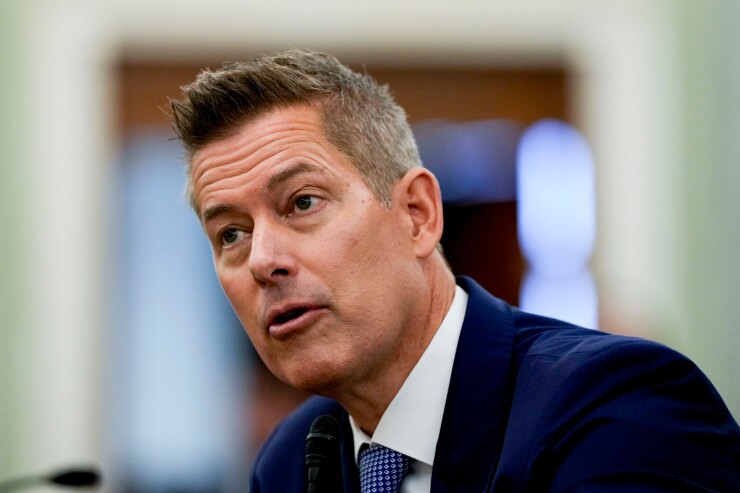
As the Trump administration attempts to conform federal spending to its priorities and policies, the U.S. Department of Transportation has issued an order that ties transportation funds to projects located in areas with high birth and marriage rates and to areas that comply with federal immigration laws.
The
Transportation Secretary Sean Duffy signed the directive
The memo "updates and resets" the "principles and standards" underpinning the DOT's polices and programs to "mandate reliance on rigorous economic analysis and cost-benefit calculations and ensure that all DOT grants, loans, contracts and DOT-supported or state-assisted contracts bolster the American economy and benefit the American people."
The administration would give preference to projects based on user-fee models and located in communities with higher-than-national birth and marriage rates. That includes the Federal Transit Agency's Capital Investment Grant Program, which funds transit, the memo said. The department should avoid funding projects that "further local political objectives" or are "purely local in nature and unrelated to a proper federal interest."
Duffy also ordered department administrators to review existing grant and loan agreements and contracts "and, to the extent permitted by the law, unilaterally amend the general terms and conditions as necessary to ensure compliance" with the order.
The directive appears to apply to discretionary grant programs and not state formula funds, said Joung Lee, the director of policy and government relations for American Association of State Highway and Transportation Officials, speaking Tuesday at
The group reached out to transportation officials who confirmed that "formula programs to states are based on statutory requirements that we're all used to, that we all know and therefore are not intended to be the subject of this memo, but that the memo would apply to the discretionary grant programs and projects," Lee said.
In an interview with The Bond Buyer, Lee said AASHTO is working with the new administration to advance its priorities.
"Every administration comes with their policy priorities across the board, certainly including
transportation. And you know, it takes time to be able to get to know the new players, especially the political leadership at U.S. DOT, which we are able to do," he said. "There has always been a long tradition of shared priorities between the state [department of transportation] community and the U.S. DOT, and that's what we'd love to focus with them on, being able to turn those priorities into reality."
In a Wednesday speech to AASHTO, Duffy said he reviewed the Biden administration's priorities in the IIJA "to identify and eliminate all Biden era programs, policies, activities, rules and orders that promote climate change activism and partisan goals. We're getting rid of that stuff and getting back to the basics of, how can we help you build and build faster and more cost effectively," Duffy said. The department aims to trim red tape —
The administration would also like to give states more independence, Duffy said.
"We have to rethink the federal state partnership. I don't know if it's been working so well," he said. "I think you guys know how to do your jobs, and I think ... the way we do business together is by giving you all a lot more autonomy, a lot more authority, a lot more freedom to do the projects that you know," he said. "And so that's going to take a dialogue and back-and-forth that we all have to have together," he said. "We need those great ideas that all of you have in this room to make sure we accomplish the goal of, again, building big, beautiful
projects that connect the country."
Scott Sowers contributed to this article.





